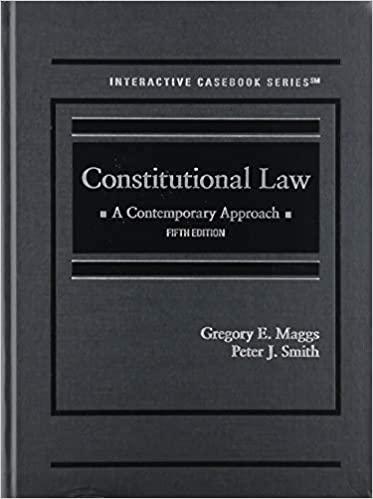Question
1.An infringement action may be brought in state or federal court, at the option of the plaintiff. a. True b. False 2.All issued patents are
1.An infringement action may be brought in state or federal court, at the option of the plaintiff.
a. True
b. False
2.All issued patents are subject to maintenance fees.
a. True
b. False
3.An infringement action may be brought in state or federal court, at the option of the plaintiff.
a. True
b. False
4.Individuals who engage in numerous transactions with the Copyright Office often establish a____________________________against which fees are drawn, so that they do not have to submit fees and payments for each transaction.
5.In patent law, nontechnical and objective factors considered in determining whether an invention is nonobvious, such as its commercial success and copying of it by others, are called____________________________.
6.As long as a work is created through hard work, or "sweat of the brow," it is protectable under copyright law.
a. True
b. False
7.Generally, one cannot patent an insignificant or trivial alteration of something already known.
a. True
b. False
8.If the Copyright Office has concerns about the copyrightability of a work, it will usually resolve these concerns in favor of the applicant under a principle called the____________________________.
9.The Copyright Office subjects all applications to a thorough and substantive examination, much like the USPTO does for trademark and patent applications.
a. True
b. False
10.All patented inventions must include a notice of patent.
a. True
b. False
11.Applicants for copyright registration who file using the eCO electronic system can track the progress of their applications online.
a. True
b. False
12.For most published works, an applicant must submit two deposit copies of the work together with the application for copyright.
a. True
b. False
13.Under the AIA, interference practice has been replaced with____________________________proceedings.
14.To be entitled to copyright protection, registered works must bear the appropriate copyright notice.
a. True
b. False
15.A specification for a utility patent must include at least one claim.
a. True
b. False
16.The paragraphs of the application that define the scope of the invention are called the____________________________.
17.Only human-made inventions can be patented.
a. True
b. False
18.Plants may be patented if they are____________________________reproduced.
19.The principle of____________________________prohibits issuance of more than one patent for the same invention. If this objection is raised by the USPTO, an inventor may overcome it by inserting a____________________________in the second application, so that both patents expire at the same time.
20.The following questions all relate to post-issuance proceedings. Select one of the following matching terms for each bulleted item: supplemental examination; disclaimer; reissuance; certificate of correction.
Process used to cancel an invalid claim
Disclaimer
Process that could be used to add an inventor who was omitted
Supplemental examination
Process that could be used to enlarge claims in an issued patent
Reissuance
Process used to immunize a patent owner against a later claim of inequitable conduct
Certificate of correction
21.To be patentable, an invention must result from a "flash of genius" or an inventor's "aha!" moment.
a. True
b. False
22.Only noncommercial works qualify for protection under the fair use defense.
a. True
b. False
23.More than 50 percent of a work must be taken for copyright infringement to be found.
a. True
b. False
24.Patent applications owe a duty of____________________________to the USPTO during the application process and must therefore disclose any information relevant to patentability.
25.Brian has made fun of and satirized the Twilight books to make social commentary. Such use would likely be protected as a____________________________, which is a particular form of fair use.
Step by Step Solution
There are 3 Steps involved in it
Step: 1

Get Instant Access to Expert-Tailored Solutions
See step-by-step solutions with expert insights and AI powered tools for academic success
Step: 2

Step: 3

Ace Your Homework with AI
Get the answers you need in no time with our AI-driven, step-by-step assistance
Get Started


